After my AHA moment in 2007 when I realized that the food I was feeding my children was most likely at the root cause of their eczema and other issues I met a lot of resistance at home, from my husband, John. When the nutritionist revealed all the hidden sugars in the foods I was feeding my children, on that fateful morning, I went home with enthusiasm and hope and started getting rid of the garbage. My giddy state ended quickly when John appeared in the doorway of the pantry and demanded to know why perfectly good food was being thrown out. That’s when our disagreements over food began and lasted about 5 years.
Change is difficult for everyone. In fact, if change were easy, there would be little need for doctors or therapists. What makes change so difficult is that, like my family, we all have gotten needs met by our patterns of behavior, and we fear (often on an unconscious level) that things will be worse, or at least less satisfying, if we do things differently. Moreover, men and women are very different creatures. Generally speaking for women, we are more trusting, more willing to give things a try, more patient, and more willing to spend money. Men on the other hand, generally speaking, are always weary of someone trying to pull one over on them. Since most men feel the financial responsibility of the house on their shoulders, they are less likely to part with money. Lastly, due to lack of trust and patience, men almost need to see the results before a treatment has even started to have the buy in.
In our online Eczema Treatment Program, dads typically present one of the biggest obstacles to kids navigating the dietary changes. And since diet is the number one factor associated with eczema in children, I feel digging deeper into dad’s food psyche is warranted. My health coach, Lindsay Kingdon, at 7LayerCharlotte recently blogged about her husband’s skeptical entry into food elimination to treat their child’s eczema. But enough of what I think, here is John’s take on what went on in his mind and our house during our time of change.
Men Eat Food From Mars, Women Eat Food From Venus
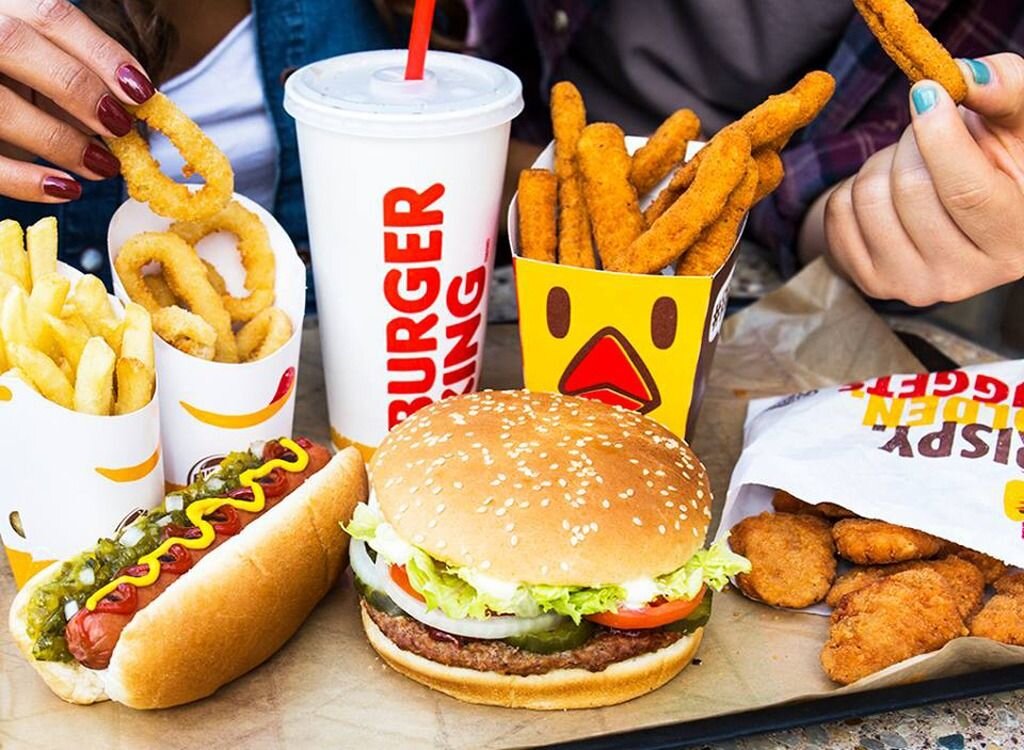
Over the last 6-7 years my relationship with food has changed dramatically. In fact, if you had even suggested that I had a “relationship” with food I would have accused you of senseless psychobabble. But now that I have come to understand the importance of food in defining my health, in fighting disease, and even benefitting my mental health, I think it’s worth examining the origins of this American man’s view on food.
As children, boys and girls discover quickly that food is treated differently amongst the sexes. From an early age boys are told to “eat up son” if you want to be big and strong. I remember sitting at the dinner table with my grandfather and my dad watching this masculine food dance play out with grunts, requests for more meat, and egging me on to eat more. I was also praised widely at the table if I requested 2nd or 3rd portions. I was long and lanky as a kid, and mentally for me that equated to not measuring up at the dinner table. At school the boys would routinely have eating contests to not only see who could eat the most pizza, but who could do it the fastest. Triumph and glory routinely surrounded the food champ of the day.
And the nature of what we were eating was also at play. The manly foods were meat, potatoes, heavy pastas, pizza, etc – you never saw a kid gloating for finishing his 10th broccoli stalk. At dessert the boys also wanted (and were given) the big slice of cake or pie. At each turn, I seemed to be rewarded for eating large volumes of calorically dense food as quickly as possible with no concern for food quality whatsoever. As processed food and fast food flourished during my childhood, this made the gorging process that much easier – how many twinkies, Big Macs, chicken nuggets, or frozen burritos could I put down in one sitting? The interesting thing is that very few if any of my friends engaged in this type of eating were overweight(although they are now!). So we didn’t associate this type of eating with obesity – rather it was just manly. And if I could be a bit more like my dad or my grandfather, then damn right I was going to throw down some food.
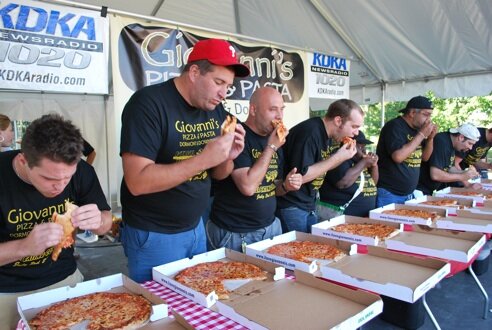
As I moved into high school and college, my food perspective was reinforced by one thing more than any other – athletics. Strength, size, weight, height, speed, competition were all the same concepts that us boys had used to dictate our diets. My coaches telling me to eat like a man, our PE teacher telling us strength gains were made in the weightroom and the kitchen. I started buying supplemental protein, weight gainer, creatine, and anything that would bump my daily calorie count – never did I hear mention of the quality of those calories. In high school our team meals were always McDonalds or pizza. In college our pregame meals were the all you can eat smorgasbord at Western Sizzlin or Quincy’s. If I was at a restaurant with my family I began to ask what the biggest portion on the menu was – just like my grandfather. These requests were always met with praise and comments like “a boy’s gotta eat!”
If I asked a girl on a date, I would always take them to Pizza Hut for dinner. For one thing it was all I could afford, but the other was that my date would only eat one slice of pizza and I would eat the entire rest of the pie. The girl would always act impressed at my eating feat. When I met my wife, she took me home to meet her family for the first time at Easter. Her Romanian family’s tradition is a large Easter feast with multiple courses. The talk of the family was on how much I could eat – I loved the praise. So you can begin to see how my relationship with food had been forged.
You would think that medical school would drastically change my opinion on food and diet. Right? Wrong. We actually spent little to no time studying nutrition (see graphic below). Other than obesity and a few incredibly rare diseases, food was never really mentioned as a central source of disease treatment. One could argue that there is so much pharmacology (thanks big pharma) to learn, that nutrition just doesn’t make the priority cut. But I think it’s more complex than that – the breadth of what has to be taught is so enormous that the professors make difficult choices on what to teach. Emphasis is put on life threatening diseases for obvious reasons and diet just doesn’t fall into that category – until now. New studies are emerging that clearly show food choice is life threatening, but 25 years ago in medical school that concept was extreme. Suffice to say that by the time I started my family, my childhood attitudes on food remained strong and were clearly delineated by sex.
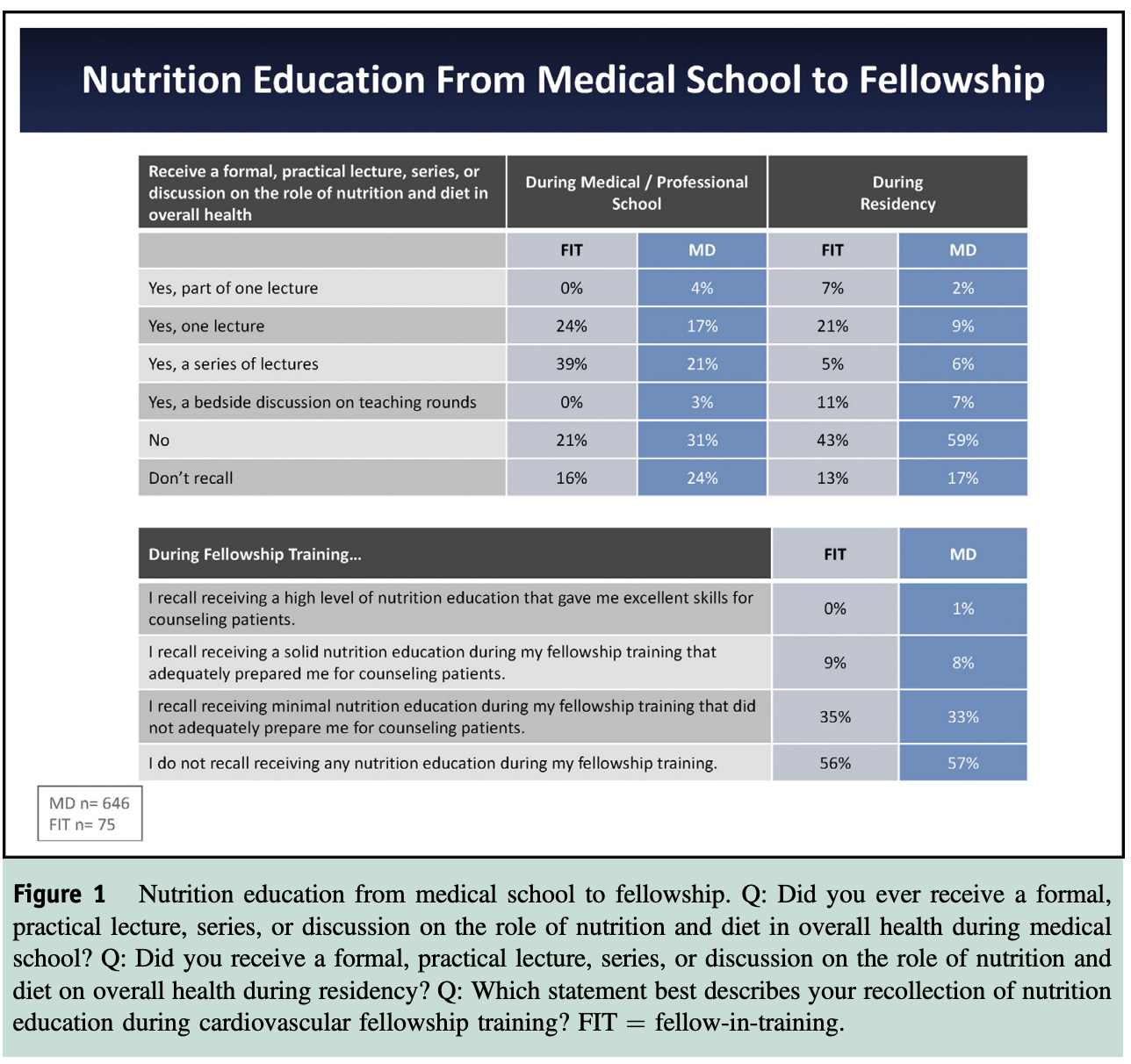
Let’s contrast this for the ladies.
I can remember from the earliest age the girls around me being admonished to “watch what you eat”. I also distinctly understood that certain foods and aspects of food were more feminine. Salad, vegetables, or really anything with a green or leafy appearance was more in the “girl food” category. I never saw a girl brag about how many burgers she could eat. I can appreciate that the caloric requirements for a growing boy and a girl are not the same, but this was much more than that. Television ads around food seemed to push boys and girls in different directions. I remember the beef ads when I was young – a gravelly voiced Sam Elliott would say “Beef – it’s what’s for dinner” while video showed a hot steaming steak and potatoes being served. I remember thinking that only girls could get bulimia or anorexia – because I had never heard of a boy limiting his food intake.
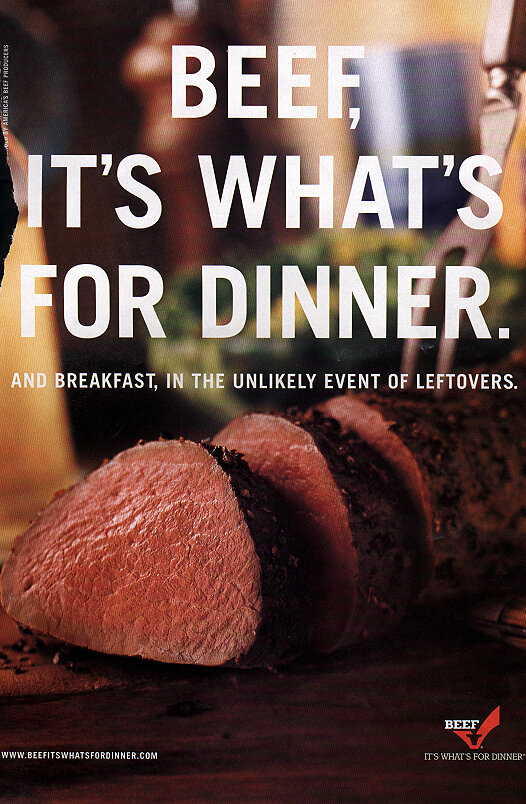
On the first date with my wife, I was preparing to ask the waiter for the check when my wife stated she would like to see the dessert menu. I almost fell out of my chair – girls were supposed to have a few bites of salad on a date. My wife had just cleaned out a whole plate of pasta and was now getting desert? Was she trying to question my manhood by out-eating me? (Maybe that’s why I married her because she was different than any woman I had ever met!)
After marriage, our family life and diet similarly carried a focus on caloric intake as the most important part of meals. Life was busy – 2 working parents, 3 young children, house, bills, sports, piano, trips, dance class, etc. Food was the last thing on our minds – just get everyone some calories so we can get to our activities on time. But then the wheels starting coming off. All 3 of my children began having health problems. First asthma, then skin issues like eczema, then terrible seasonal allergies, ADHD, anxiety and the list was growing. All of them were on medications – but I let my wife handle the kids illness (she is the pediatrician after all).
Then one day she walks in and announces that origin of all my kids illnesses was their diet. What?? None of my kids were overweight – the only real food problem I was aware of was eating too much causes obesity. I frankly disagreed with her conclusion but she was steadfast in her decision. She began throwing away all the snack food. She began changing the type of food she purchased. (According to me she began ruining my life) Organic became a common word at my house. Labels with terms like grass fed, non-GMO, gluten free, and dairy substitute started to fill our refrigerator. I revolted. Not only was this adventure a waste of time, but also a waste of money as many of these foods were more expensive.
But as I look back – and retrospect is always 20/20 – these changes challenged many of long held beliefs on food. I looked at organic products as “tree hugging sissy foods”. I felt that no self respecting American man would put non-dairy cheese on his pizza. The thought of going to a bar or restaurant with my buddies and requesting mixed vegetables rather than fries, or asking for a gluten free bun was ludicrous. In fact I would lament on the ridiculous food changes my wife was attempting to institute at home. But moreover, I would relentlessly harass my wife about these diet changes at home – often times in front of the kids. But I would always eat whatever she made primarily because I was too lazy to make something myself. As I reflect on this time, I realize that my feelings on food were part of my perceived masculinity – and that couldn’t be questioned.
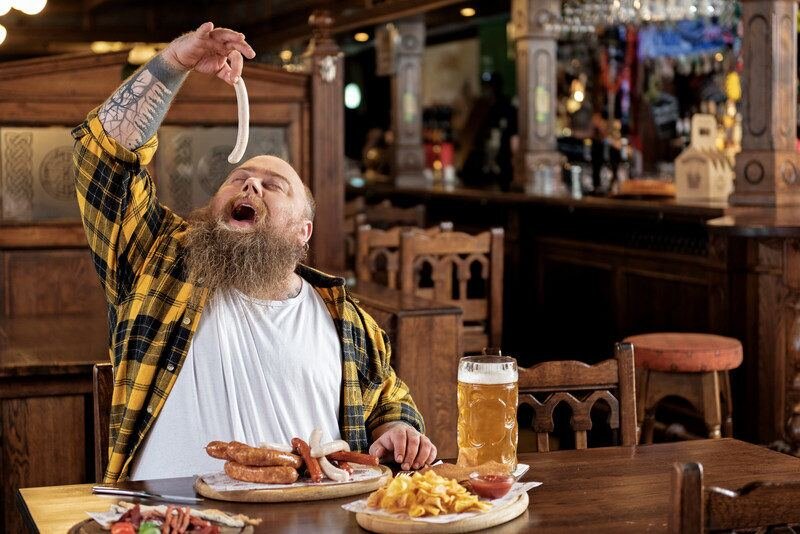
Thankfully my wife is a persistent woman – and when she decided that our family’s diet was tied to our health problems, she was determined to change that. This left us at a crossroads. My ego couldn’t muster the confidence to accept a paradigm shift this large. And we went on this way for years – until I began to have issues. Joint pain, recurrent colds and flu, pneumonia, more difficult keeping weight in check – what the hell? I was exercising like crazy but still having all these issues. So I decided to try a few small food experiments – like ending my nightly ritual of 2 cereal bowls before bed. Interestingly, my stomach pain went away. And then, I decided to cut out dairy altogether, and my joint pain went away. I announced to my wife, “I think that the food we are eating may be causing an issue with our health!” She almost stabbed me in the eye that very moment.So let’s just go ahead and acknowledge the elephant in the room – selfishly, I refuted the food issue when it was potentially implicated in my children’s health, but embraced the notion once I saw a benefit to my health. I just think there was too much history, ego, and bravado mixed up in my screwed up relationship with food. The ironic thing is that I am absolutely meticulous about so many other decisions/purchases in my life, yet food choice got a free pass from my scrutiny. I’m not sure if it’s maturity, more concerns about preserving my health as I age, or just the confidence to know that food does not define me as a man. I know embrace the fact that I seem to be the only guy in the grocery store reading the food labels. And I can take it and dish it out when my buddies at the bar ridicule my order.
 I don’t have it all figured out but I now know this – all calories are NOT created equal. I also know that women tend to drive the food choices in the home but may not realize the amount of mental baggage the men in their lives carry around about food. If this was my struggle as a supposed health educated physician, imagine what other men/dads must go through when they are told that food is medicine and you need to completely shift your position on diet choices. But trust me guys – of all the changes you could make in your life, this one continues to pay dividends. Not only a healthier family, but a better you.
I don’t have it all figured out but I now know this – all calories are NOT created equal. I also know that women tend to drive the food choices in the home but may not realize the amount of mental baggage the men in their lives carry around about food. If this was my struggle as a supposed health educated physician, imagine what other men/dads must go through when they are told that food is medicine and you need to completely shift your position on diet choices. But trust me guys – of all the changes you could make in your life, this one continues to pay dividends. Not only a healthier family, but a better you.
You can also hear more about Dr Temple’s eczema treatment process on the Wellness Mama Podcast HERE





